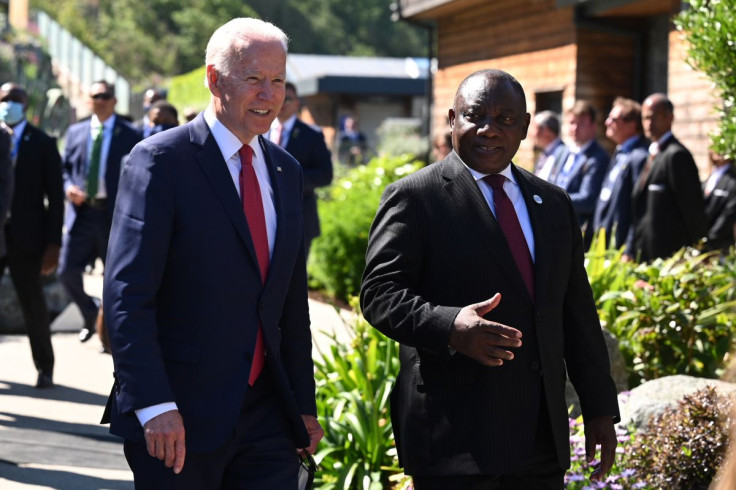Biden Finds South Africa And IS Handy Ahead Of Polls

South Africa has been in the news recently for all the wrong reasons. The latest to strike the 60 million southernmost African nation is the terror-related sanctions, imposed by the Biden administration on the eve of U.S. mid-term polls. For that matter, U.S. presidents have always treated the whole continent of Africa as their backyard and have been striking at it at will in the name of the War on Terror.
Biden, facing dwarfing popularity, found Africa good to champion the cause of War on Terror against the Islamic State (IS) ahead of elections in the country which will determine who controls the Congress.
The U.S. went to the polls on Nov. 9. As of now, the Congress is controlled by Biden's Democrat Party, but the Republicans are predicted to emerge winners in the House of Representatives.
Losing either chamber would make the next two years difficult for Biden's presidency.
This time, Biden zeroed in on South Africa by imposing the second round of sanctions on Nov. 7.
The administration alleges that the Islamic State is at its standard practices for minting money in Africa as part of its expansion plans.
To bankroll its branches elsewhere and to procure weapons, the alleged terror network is relying on local nefarious fundraising projects like kidnapping for ransom and extortion.
Though South Africa has faced hardly a few terror strikes since the War on Terror was started under George W Bush Jr's tenure, the U.S. alleges that IS supporters are exploiting South Africa's financial system to provide finances and logistics to Islamic groups operating elsewhere on the continent. The South African government first publicly acknowledged the presence of IS cells in the country in 2016.
To substantiate the administration's claims, the U.S. Treasury Department in its statement referenced a United Nations Security Council report which stated in July that South Africa-based IS members are transferring funds to their leadership and affiliates across the continent.
The administration alleges that the Islamic State is expanding its presence in Africa after its defeats in Iraq and Syria. So, the jihadist outfit is in dire need of funds and is getting it from South Africa.
Militant Islamist group violence in Africa has risen inexorably over the past decade, expanding by 300 percent, observed an August assessment on the entire continent by the U.S. administration.
The latest sanctions, in less than a week, target South African entities and people, including one cell leader, Farhad Hoomer.
The administration alleged that four people -- Nufael Akbar, Yunus Mohamad Akbar, Mohamad Akbar, and Umar Akbar -- and eight companies that include gold trading and construction firms, were operating as part of the South African Islamic State cell.
The move is aimed at curbing their ability to exploit South Africa's economy to raise funds to support IS activities.
The sanctions come after the U.S. warned of a possible terror attack in Sandton, Johannesburg, without providing more information, on Oct. 26. Similar terror warnings were also issued against Nigeria.
The Treasury last week issued sanctions against a weapons trafficking network in Somalia and the IS-linked Al-Shabaab extremist group.
After 9/11, the U.S. has increased its military engagement in Africa, building a sprawling network of outposts across the continent -- from Senegal to Kenya, and Tunisia to Gabon -- conducting drone strikes from Libya to Somalia, as well as commando raids from one side of Africa to the other. America's commandos are deployed to 17 African nations.
Established in 2007, the U.S. military's Africa Command (AFRICOM) has become a continent-wide military footprint. Then there are the Special Forces corps and a vastly expanded CIA operations division, gathering information and intelligence input on Africa.
In addition to myriad engagements by conventional troops across Africa, Special Operations Command Africa (SOCAFRICA) focuses on four major areas -- East Africa, the Lake Chad Basin, the Sahel, and the Maghreb and the U.S. consistently sends its most elite troops -- Army Green Berets, Navy SEALs, and Marines -- to these African hotspots.
The worsening security situation in Africa reflects poorly on AFRICOM and SOCAFRICA to counter violent extremist organizations like Jama'at Nurat al Islam wal Muslimin in Burkina Faso, Ahlu Sunnah wa Jama'a in Mozambique, the south-western neighbor of South Africa, Al-Shabaab group in Somalia and the Boko Haram in Nigeria, which are reported to be offshoots of the alleged Islamic State.
Africa has been an easy target for U.S. presidents as the U.S. government is always tight-lipped in disclosing the scope and area of military operations and engagements with authoritarian governments across the continent.
The Obama administration conducted 37 declared airstrikes over eight years in Somalia. The number rose to 205 during Donald Trump's single term. The Biden administration has carried out 11 attacks against the Al-Shabaab militants who control 70 percent of south and central Somalia.
By using African governments as proxies, Biden can now dispatch billions of dollars worth of weapons to Africa, in the guise of protecting U.S. citizens and U.S. firms. The stage is set for a wider, partly proxy, conflict.





